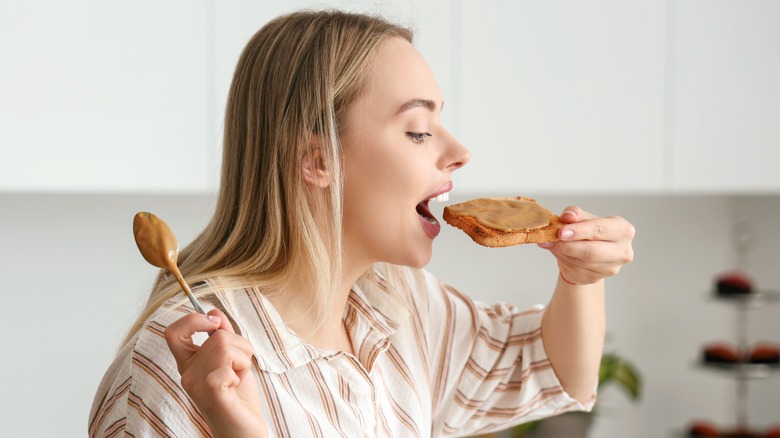Sneaky Peanut Butter Ingredients You Should Avoid Eating At All Costs
Peanut butter is found in many kitchens around the world. It's a popular sandwich filling, a common topping, a timeless addition to kids' lunchboxes for generations, and a convenient anytime snack. Is it any wonder that people love it so much? It's a healthy, universal staple found in millions of kitchens across the United States. In fact, nearly 90 million Americans ate a jar of peanut butter in the last month alone.
It's no surprise, given the prevalence of the protein-packed food across so many different food categories and recipes. Ryan Christofferson, a senior brand manager for Skippy, tells CNBC, "Peanut butter is something that always has been popular for decades with consumers but is continuing to grow not just as a product in a jar, but in new formats and in new places. So, people are thinking about, 'how can I get more peanut butter into snacks, into desserts and other places, into cooking sauces."
But not all varieties and peanut butter recipes are the same. Some brands make their peanut butters with unexpected — and unwelcome — ingredients. Some of those may even be touted as "healthy," fooling you into believing you're eating something that's good for you. Not only are those surprising additions to the recipe unnecessary, but they could even pose a health risk to you or your family. Here are a few sneaky peanut butter ingredients you should avoid eating at all costs.
Avoid hydrogenated oils in peanut butter
Hydrogenated oils are commonly added to peanut butter to stabilize it. These oils also prevent the peanut butter from separating. To the average peanut butter consumer, that may seem fairly sensible. Shelf-stable peanut butter is better than the alternative — and peanut butter that separates in the jar can be difficult to stir, leaving behind a greasy mess that can take away from the experience of enjoying one of your favorite foods.
But hydrogenated oil can also contain trans fats. During the hydrogenation process, manufacturers combine some type of liquid fat with hydrogen to yield a more stable type of fat that isn't affected by temperature. This is why hydrogenated oil is so vital to stabilizing peanut butter. Oils can be either partially or fully hydrogenated. The process of partially hydrogenating fat and hydrogen causes trans fats to develop in abundance.
Trans fats have a terrible reputation. Also known as trans fatty acids, they are known to increase the risk of developing heart disease by raising the "bad" low-density lipoprotein (LDL) cholesterol levels and reducing the "good" high-density lipoprotein (HDL) cholesterol levels. They may also contribute to the risk of developing stroke or type 2 diabetes. While the United States Food and Drug Administration (FDA) has banned the inclusion of trans fats in foods, that doesn't mean they're not there. In America, foods that contain 0.5 grams or less of trans fats can claim they contain 0 grams of trans fats on the nutrition label.
Steer clear of added sodium in peanut butter
Sometimes manufacturers add salt to enhance the flavor of the peanut butter. That can be great if you don't have to watch your sodium intake. But many people need to follow an eating plan that's low on salt to manage their blood pressure, such as people who have kidney disease or edema. In these situations, it's important to seek out options that are either completely unsalted or lower in sodium.
That's largely due to peanut butter's elevated sodium content. A single serving can contain approximately 150 milligrams of salt. Given that the FDA's recommended daily value for adults is under 2,300 milligrams, it's important to be mindful of just how much peanut butter you eat if you're watching your salt intake. Serving sizes play a huge role, and it's easy to go heavy on the peanut butter, whether you're spooning it straight from the jar, smearing it on toast, or adding it to a rice cake for some flavor.
Luckily, it's easy to find low- and no-salt versions of peanut butter. Because brands add the salt themselves, you can weed out those that contain sodium and limit yourself to the rest. Look specifically for varieties that are labeled "natural," since peanut butter in its natural state contains absolutely no salt.
Watch out for too much sugar in peanut butter
It's not unusual for peanut butter brands to add sugar to peanut butter. It can make it more palatable for people who prefer a more dessert-like taste, or simply reduce the naturally nutty quality of plain peanut butter. But there's a downside to consuming too much sugar: it can cause weight gain, drive up the risk of developing conditions like heart disease and type 2 diabetes, and harm dental health.
And this is one of the big reasons why professionals warn against buying peanut butter brands that contain sugar. At their most basic, says Vanessa Rissetto MS, RD, CDN, to Eat This, Not That!, "Let's look for peanuts, oil, salt—that's generally the standard that should be sufficient. We don't need sugar in our peanut butter as it is sweet enough."
Watching for sugar in your peanut butter is also an easy way to cut back on your daily intake. If peanut butter is a regular part of your day, you can make a huge difference to your diet — and your health — by seeking out lower-sugar varieties. Be mindful of how that sweet taste appears, too, because it can be due to different ingredients. Explains Toby Smithson, MS, RDN, LD, CDCES, FAND, "Cutting back on hidden sugars like sugar and molasses in food products (like some brands of peanut butter) is a great way to help reduce added sugars in your eating plan.
High fructose corn syrup can ruin your peanut butter
You'll find high-fructose corn syrup (HFCS) in many different foods. If it's in your peanut butter, the food's nutritional value plummets dramatically. That's because, when consumed regularly, this sweetening agent could ultimately lead to serious, chronic diseases like type 2 diabetes, heart disease, obesity, and metabolic health problems.
What exactly is HFCS doing in peanut butter, anyway? Consider first that it's a cheaper alternative to sugar. If a manufacturer is trying to save money, adding this to their peanut butter is certainly one way to go about that. It's also sweeter than sugar, so if their goal is to appeal to a certain audience (like children), they could easily add HFCS to the recipe. Look closely at the ingredient lists of lesser-known peanut butter brands and varieties that are mixed with jelly, chocolate, or other flavorings.
As for what makes HFCS so harmful, Mark Hyman, MD, a functional medicine doctor, tells Cleveland Clinic, "Fructose goes straight to your liver and starts a fat production factory. It triggers the production of triglycerides and cholesterol." And, he adds, it can "[p]unch little holes in your intestinal lining, causing what we call a leaky gut." It's well worth steering clear of HFCS in peanut butter to protect your long-term health.
Skip the peanut butters made with palm oil
If you see palm oil on the ingredient list, it's a good idea to put that peanut butter jar back on the shelf. Manufacturers add this substance to solidify the food, make it more shelf stable, and improve the texture so that it's more manageable. However, the oil is loaded with saturated fats, which could increase your risk of developing heart disease, type 2 diabetes, and other conditions.
As with HFCS, consumers may wonder what exactly palm oil is doing in peanut butter. Unfortunately, many popular brands have palm oil, largely because it lends the peanut butter a more malleable consistency. While that makes it easy to spread on toast and bananas, it instantly takes away from peanut butter's nutritional value. Always check the label, whether you're purchasing a popular brand or a variety that is labeled "no-stir." Says Shena Jaramillo MS, RD to Eat This, Not That!, "Many no-stir peanut butter brands even if labeled organic can contain a product called palm oil. This product acts like a saturated fat in the body and over time can lead to added weight gain and potentially hypertension."
What's more, palm oil contains monoglycerides and diglycerides, which are types of processed fats that can increase your risk of developing damaging health issues like heart disease, type 2 diabetes, and stroke. Though the FDA hasn't published specific consumption guidelines for these fats, you can protect yourself from health risks simply by watching your intake.
Some people may not tolerate phosphorus in peanut butter well
One of the key nutrients in peanuts is phosphorus. Generally, phosphorus is a vital mineral that contributes to healthy teeth and bones. It also plays a prominent role in the body's waste filtration process, aiding the kidneys in performing this important function. Additionally, the body uses phosphorus for muscle and cellular repair, and even to minimize discomfort after exercise.
Given these benefits, you might think that it's important to get as much of it as you possibly can. Luckily, phosphorus is abundant in many foods, and therefore quite easy to consume through a regular diet. The downside is that not everyone can tolerate higher levels of phosphorus. This problem can occur in people who have later stages of kidney disease or people whose bodies don't regulate calcium efficiently. It can also affect people who consume too much phosphorus and not enough calcium. People who have iron or zinc deficiencies may also have trouble with phosphorus, as it can prevent the body from absorbing those vital minerals.
If any of these concerns apply to you, the only way to be certain about whether it's safe for you to consume peanut butter is to consult with a medical professional. For example, if you have kidney disease, your nephrologist may recommend that you consume only a certain amount of phosphorus daily, or you may need a renal dietitian who can safely incorporate limited amounts of peanut butter in your diet.
Check for monoglycerides in some kinds of peanut butter
While not a common peanut butter ingredient, monoglycerides may be added to some types — especially those that are blended with other flavorings, like jelly or chocolate. Manufacturers add monoglycerides to prevent the peanut butter from separating in the jar. While that in and of itself appeals to consumers, what's less appealing is the fact that monoglycerides are rich in trans fats. They can considerably raise your risk of developing heart disease, stroke, and type 2 diabetes.
What's more, people don't typically consider peanut butter "unhealthy," and that's largely because the trans fat content may not even appear on the label if the product contains 0.5 milligrams or less. Luckily, you don't need to rely solely on manufacturers when it comes to choosing the right type of peanut butter. Those varieties that are labeled "natural" contain nothing more than peanuts (and occasionally salt). Because there's no emulsifier in the recipe, the peanut oil in the jar naturally separates and rises to the top.
You'll be able to see this clearly. While it may be inconvenient to stir a little more vigorously, the peace of mind knowing that your peanut butter is actually pure, natural, and free of potentially harmful agents is well worth the extra effort. According to the Center for Science in the Public Interest, trans fats are "the most harmful in the food supply."
Potassium sorbate could sneak into your peanut butter
Potassium sorbate is a preservative consisting of potassium chloride and sorbic acid that some manufacturers use to protect the integrity of the peanut butter during its journey from the plant to the store shelf to, finally, your home. This compound doesn't have a taste, and it has actually been ruled safe to consume by the FDA. However, it can, in rare instances, cause an allergic reaction.
Explains Alyssa Wilson, MS, RDN, LD, to Eat This, Not That!, "Although the FDA states that potassium sorbate is generally recognized as safe (GRAS), it is still best to limit food additives that could possibly trigger an inflammatory response. You can avoid potassium sorbate by reading the food ingredients label, limiting processed foods, and choosing to eat a whole-food, anti-inflammatory diet."
Despite the fact that such reactions are generally uncommon, it's still worth being aware of them. Some types of peanut butter do contain potassium sorbate, along with products that contain peanut butter, like crackers, cookies, and cakes. If you're aware that you need to limit potentially inflammatory agents, it's best to be mindful of the type of peanut butter that you buy. Luckily, it is typically added to ingredient lists, so you can easily weed out those products that may not agree with you.








